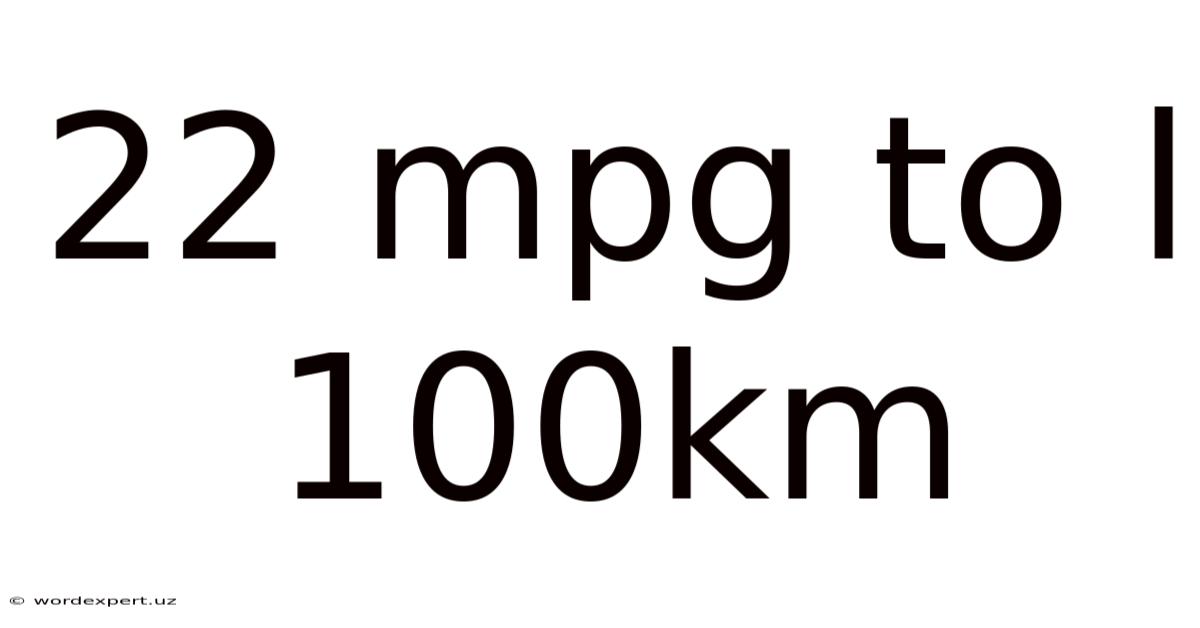22 Mpg To L 100km
wordexpert
Sep 25, 2025 · 4 min read

Table of Contents
Converting MPG to L/100km: A Comprehensive Guide
Understanding fuel efficiency is crucial in today's world, especially with rising fuel prices and growing environmental concerns. Many countries use liters per 100 kilometers (L/100km) to express fuel consumption, while others, like the United States, utilize miles per gallon (mpg). This article provides a comprehensive guide on converting mpg to L/100km, explaining the process in detail, offering insights into the calculation, and addressing frequently asked questions. Understanding this conversion will empower you to compare fuel economy across different vehicles and regions effortlessly.
Understanding MPG and L/100km
Before diving into the conversion, let's clarify what each unit represents:
-
Miles per gallon (mpg): This metric indicates how many miles a vehicle can travel using one gallon of fuel. A higher mpg value signifies better fuel efficiency.
-
Liters per 100 kilometers (L/100km): This metric shows how many liters of fuel a vehicle consumes while traveling 100 kilometers. A lower L/100km value indicates better fuel efficiency.
The key difference lies in the units used: miles vs. kilometers and gallons vs. liters. This necessitates a conversion process involving multiple unit conversions.
The Conversion Formula: From MPG to L/100km
The conversion from mpg to L/100km isn't a simple one-step process. It involves several steps, each requiring accurate calculations. Here's the breakdown:
Step 1: Converting Miles to Kilometers
One mile is approximately equal to 1.60934 kilometers. Therefore, to convert miles to kilometers, multiply the number of miles by 1.60934.
Step 2: Converting Gallons to Liters
One US gallon is equivalent to approximately 3.78541 liters. To convert gallons to liters, multiply the number of gallons by 3.78541. Note that there's a difference between US and imperial gallons; this calculation uses the US gallon. If you have imperial gallons, use the appropriate conversion factor (approximately 4.546 liters).
Step 3: Combining the Conversions
The formula to convert mpg to L/100km combines these two steps and incorporates the 100km distance:
L/100km = (235.215 / mpg)
This simplified formula directly converts mpg to L/100km, eliminating the need for multiple individual calculations. The constant 235.215 is derived from the combination of the conversion factors for miles to kilometers and gallons to liters, adjusted for the 100km distance.
Example Calculation: Converting 22 mpg to L/100km
Let's illustrate the conversion using the example provided: 22 mpg.
Using the simplified formula:
L/100km = (235.215 / 22 mpg) ≈ 10.7 L/100km
Therefore, a vehicle with a fuel efficiency of 22 mpg is equivalent to approximately 10.7 L/100km.
A Deeper Dive into the Calculation: Step-by-Step Approach
While the simplified formula is convenient, understanding the underlying steps enhances comprehension. Let's break down the conversion step-by-step:
-
Start with 22 mpg: This means the vehicle travels 22 miles per gallon.
-
Convert miles to kilometers: 22 miles * 1.60934 km/mile ≈ 35.407 km
-
Convert gallons to liters: 1 gallon * 3.78541 L/gallon ≈ 3.78541 L
-
Determine fuel consumption per kilometer: 3.78541 L / 35.407 km ≈ 0.1069 L/km
-
Calculate fuel consumption per 100 kilometers: 0.1069 L/km * 100 km ≈ 10.69 L/100km
This step-by-step approach confirms the result obtained using the simplified formula, reinforcing the accuracy of the conversion.
Factors Affecting Fuel Efficiency
Several factors influence a vehicle's fuel economy, making direct comparisons between different vehicles complex. These factors include:
-
Vehicle Type: Larger, heavier vehicles generally have lower mpg than smaller, lighter ones.
-
Engine Size and Type: Engine size and type significantly impact fuel consumption. Smaller, more efficient engines generally offer better fuel economy.
-
Driving Style: Aggressive driving habits (rapid acceleration, hard braking) reduce fuel efficiency.
-
Road Conditions: Traffic congestion, hills, and rough road surfaces can increase fuel consumption.
-
Vehicle Maintenance: Proper tire inflation and regular vehicle maintenance contribute to optimal fuel efficiency.
-
Environmental Conditions: Temperature and weather conditions can affect fuel consumption; cold weather often leads to reduced efficiency.
Frequently Asked Questions (FAQ)
Q: Is there a difference between US mpg and imperial mpg?
A: Yes, there is a difference. The conversion factor varies slightly due to the difference in gallon sizes. The calculations provided in this article use the US gallon.
Q: How accurate is the conversion formula?
A: The conversion formula is highly accurate, provided the correct conversion factors are used. Minor discrepancies might arise due to rounding during calculations.
Q: Can I use this conversion for all types of vehicles?
A: Yes, this conversion applies to all vehicles that express fuel economy in mpg. However, remember that various factors influence actual fuel consumption, as discussed earlier.
Q: Why is L/100km preferred in some countries?
A: L/100km is often preferred because it provides a more intuitive understanding of fuel consumption for longer distances and is easier to compare fuel efficiency across different vehicles.
Conclusion
Converting mpg to L/100km is crucial for comparing fuel efficiency across different vehicles and regions. Understanding the underlying calculation, including the individual steps and the simplified formula, enhances your ability to analyze and interpret fuel economy data. Remember that various factors affect a vehicle's actual fuel consumption, highlighting the importance of considering these factors when comparing fuel efficiency. By mastering this conversion, you gain a clearer picture of your vehicle's fuel consumption and can make informed decisions about fuel efficiency.
Latest Posts
Latest Posts
-
How To Calculate Molar Enthalpy
Sep 25, 2025
-
Chance Of Lung Cancer Calculator
Sep 25, 2025
-
Bpc 157 Injection Dosage Calculator
Sep 25, 2025
-
How Many Days Since 4 18 25
Sep 25, 2025
-
Cubic Inches Converted To Gallons
Sep 25, 2025
Related Post
Thank you for visiting our website which covers about 22 Mpg To L 100km . We hope the information provided has been useful to you. Feel free to contact us if you have any questions or need further assistance. See you next time and don't miss to bookmark.